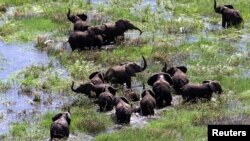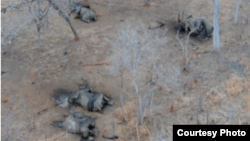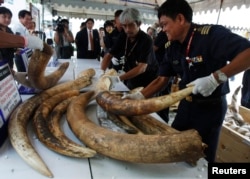MAPUTO —
Hunting for ivory on the African continent has tripled, and elephants now are facing their gravest crisis in decades, according to the U.N. Environmental Protection Agency and other conservation groups. One country, Mozambique, is losing more than a thousand elephants to poachers every year - making it one of the nations most affected by Asia's increasing demand for ivory.
In the race to feed the hunger for ivory trinkets and carvings in the East, elephant poachers have found easy hunting grounds in Mozambique.
At last count five years ago, 15,000 elephants roamed the vast Niassa reserve in the northernmost part of the country. But those numbers are dwindling fast.
For hundreds of kilometers, the Rovuma River forms a natural frontier between the park and Tanzania. All the poachers have to do is cross over in canoes to get to the elephants, which they attack with high-caliber weapons.
Deadly poachers
The Wildlife Conservation Society, an international non-profit, recently partnered with the Mozambican government to manage the reserve. The organization's technical advisor, Carlos Lopes-Pareira, said poachers are able to gun down as many as five elephants at a time.
“They go after the matriarch. They create a temporary state of confusion. While the other elephants are looking for guidance from the matriarch, they are shot while they are moving around in different directions,” said Lopes-Pareira.
Officials say that since 2009, the number of elephants killed by poachers in Niassa has tripled. Poachers kill an average of three elephants a day. That is more than one thousand a year.
“The destruction is such that in probably eight years we will have very few elephants or what we could call a non-viable population of elephants,” said Lopes-Pareira.
Rangers are outgunned
Rangers try to stop the poachers, though it is a lopsided battle. There are only 40 rangers to patrol the park, which is the size of Norway, and the rangers are armed with rifles that date back to World War II.
Even if they manage to catch a poacher, the chances of sending him to jail are minimal. Mozambique’s penal code dates back to Portuguese colonial times, and does not recognize poaching as a crime.
“The law is very lenient with poachers in Mozambique. In fact it is like a traffic transgression, not a crime,” said Lopes-Pareira.
The director of Mozambique’s National Conservation areas, Francisco Pariela, said there have been many poachers caught in Niassa over the past few years, but catching them is not enough. He said there have been many cases of people being apprehended, but because the law is lacking, no real action was taken against them - other than fining them.
Rampant problem
Pariela blames organized crime syndicates that operate out of countries to the north, but acknowledges locals are also involved.
"These syndicates follow a certain route," he said, "that goes from Somalia, Kenya, Tanzania, until they reach Mozambique. When they arrive, they use the local community because local people have a financial weakness, they get used." He admitted that even some state employees are involved in poaching and trafficking in ivory.
According to the U.N. poaching report, because of corruption, poverty and weak governance, criminal syndicates find it easy to move the ivory across borders to sell in China, Vietnam and Thailand.
Lopes-Pareira said the poachers will be tough to stop without more resources.
“We will need aerial support. We will need the support of authorities and support of communities, and this is not an easy task to achieve all at the same time," he said. "We are considering the involvement of the armed forces. They would have a supportive role but not the main role in this process.”
The Niassa reserve is hoping to train 100 rangers by the end of the year. Meanwhile, tougher anti-poaching legislation soon will go to parliament.
In the race to feed the hunger for ivory trinkets and carvings in the East, elephant poachers have found easy hunting grounds in Mozambique.
At last count five years ago, 15,000 elephants roamed the vast Niassa reserve in the northernmost part of the country. But those numbers are dwindling fast.
For hundreds of kilometers, the Rovuma River forms a natural frontier between the park and Tanzania. All the poachers have to do is cross over in canoes to get to the elephants, which they attack with high-caliber weapons.
Deadly poachers
The Wildlife Conservation Society, an international non-profit, recently partnered with the Mozambican government to manage the reserve. The organization's technical advisor, Carlos Lopes-Pareira, said poachers are able to gun down as many as five elephants at a time.
“They go after the matriarch. They create a temporary state of confusion. While the other elephants are looking for guidance from the matriarch, they are shot while they are moving around in different directions,” said Lopes-Pareira.
Officials say that since 2009, the number of elephants killed by poachers in Niassa has tripled. Poachers kill an average of three elephants a day. That is more than one thousand a year.
“The destruction is such that in probably eight years we will have very few elephants or what we could call a non-viable population of elephants,” said Lopes-Pareira.
Rangers are outgunned
Rangers try to stop the poachers, though it is a lopsided battle. There are only 40 rangers to patrol the park, which is the size of Norway, and the rangers are armed with rifles that date back to World War II.
Even if they manage to catch a poacher, the chances of sending him to jail are minimal. Mozambique’s penal code dates back to Portuguese colonial times, and does not recognize poaching as a crime.
“The law is very lenient with poachers in Mozambique. In fact it is like a traffic transgression, not a crime,” said Lopes-Pareira.
The director of Mozambique’s National Conservation areas, Francisco Pariela, said there have been many poachers caught in Niassa over the past few years, but catching them is not enough. He said there have been many cases of people being apprehended, but because the law is lacking, no real action was taken against them - other than fining them.
Rampant problem
Pariela blames organized crime syndicates that operate out of countries to the north, but acknowledges locals are also involved.
"These syndicates follow a certain route," he said, "that goes from Somalia, Kenya, Tanzania, until they reach Mozambique. When they arrive, they use the local community because local people have a financial weakness, they get used." He admitted that even some state employees are involved in poaching and trafficking in ivory.
According to the U.N. poaching report, because of corruption, poverty and weak governance, criminal syndicates find it easy to move the ivory across borders to sell in China, Vietnam and Thailand.
Lopes-Pareira said the poachers will be tough to stop without more resources.
“We will need aerial support. We will need the support of authorities and support of communities, and this is not an easy task to achieve all at the same time," he said. "We are considering the involvement of the armed forces. They would have a supportive role but not the main role in this process.”
The Niassa reserve is hoping to train 100 rangers by the end of the year. Meanwhile, tougher anti-poaching legislation soon will go to parliament.






